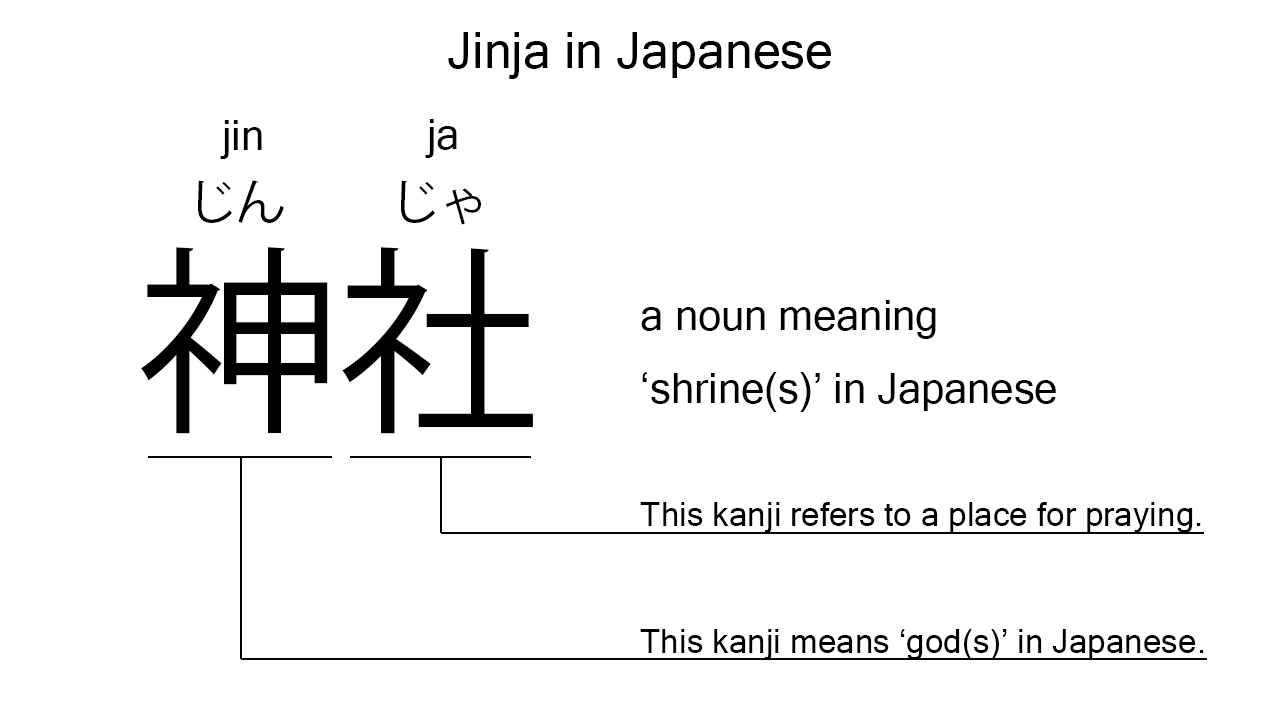What does “jinja” mean in Japanese?
Native speakers say “jinja” to mean ‘shrine’ in Japanese. Perhaps, some Japanese learners know this word as it is sometimes used in Japanese movies, novels, manga, anime, and the like. In this blog post, however, I will explain this word in detail based on its kanji expression. And also, I will explain how to use it through example sentences. My explanations would help Japanese learners understand “jinja” more clearly. Then, let’s get started!
Contents
Definition and meaning of “jinja”
Let me start with the definition and meaning of “jinja”.
- jinja – 神社 (じんじゃ) : a noun meaning ‘shrine’ in Japanese. This can also work as plural. Learn more about Japanese plural.
The definition and meaning are simple and clear. To understand this noun more clearly, however, let me explain its kanji characters in detail, one by one.
What does “jinja” literally mean in Japanese?
The kanji expression of “jinja” consists of the following two kanji characters:
- 神 : a kanji character used to mean ‘god’ in Japanese.
- 社 : a kanji character used to refer to a place for praying or a place where people get gathered. This can also be found in other words like “kaisha“.
These two kanji characters tell us that “jinja” literally means a ‘place for praying to gods’ in Japanese. This literal interpretation is very close to the actual meaning. Shrines are indeed places for praying to gods.

When we meet new kanji expressions, we should check their kanji characters in detail to understand their meanings clearly and deeply. In many cases, kanji characters tell us a lot about the meanings of the expressions they form. Actually, here, we could get the better understanding of “jinja” through the detailed kanji check above.
So far, I’ve explained the definition and meaning of “jinja” together with its kanji characters. Then, let me explain how to use it through the example sentences below.
Example #1: how to say “shrine” in Japanese
watashi tachi wa nippon de jinja ni it ta – 私達は日本で神社に行った (わたしたちはにっぽんでじんじゃにいった)
We went to a shrine in Japan.
Below are the new words used in the example sentence.
- watashi – 私 (わたし) : a pronoun meaning ‘I’ in Japanese.
- tachi – 達 (たち) : a suffix used after a noun or pronoun to make its plural form. In the example, this is used after “watashi” to make its plural form, “watashi tachi”, which means ‘we’ in Japanese.
- wa – は : a binding particle working as a case marker or topic marker. In the example, this works after “watashi tachi” to make the subject in the sentence.
- nippon – 日本 (にっぽん) : a noun meaning ‘Japan’ in Japanese.
- de – で : a case particle used to say where someone does something. In the example, this is used after “nippon” to say “in Japan” in Japanese.
- ni – に : a case particle used to say where someone or something goes. In the example, this is used after “jinja” to say where the speakers went.
- it – 行っ (いっ) : one conjugation of the verb, “iku“, which means ‘to go’ in Japanese. In the example, it has been conjugated for the better connection with its following word.
- ta – た : an auxiliary verb used after a verb, adjective, or auxiliary verb to make its past tense form. In the example, this is used after “it” to make its past tense form, “it ta”.
This is a typical usage of “jinja”. In the example, it works together with the case particle, “ni”, to say “to a shrine” in Japanese.
Example #2: another usage of “jinja”
jinja wa totemo utsukushikat ta – 神社はとても美しかった (じんじゃはとてもうつくしかった)
The shrine was very beautiful.
Below are the new words used in the example sentence.
- totemo – とても : an adverb of degree meaning ‘very’, ‘much’, or such in Japanese. In the example, this works in front of “utsukushikat ta” to emphasize its meaning.
- utsukushikat – 美しかっ (うつくしかっ) : one conjugation of the i-adjective, “utsukushii“, which means ‘beautiful’ in Japanese. In the example, it has been conjugated for the better connection with its following word.
This is another typical usage of “jinja”. In this example, it works together with the binding particle, “wa”, to become the subject in the sentence. When we want to say “shrine” in Japanese, anyway, this noun is always a very good option.
Summary
In this blog post, I’ve explained the definition and meaning of “jinja” in detail based on its kanji expression. And also, I’ve explained how to use it through the example sentences. Let me summarize them as follows.
- jinja – 神社 (じんじゃ) : a noun meaning ‘shrine’ in Japanese. This can also work as plural. These two kanji characters literally mean a ‘place for praying to gods’ in Japanese. This literal interpretation is very close to the actual meaning. Shrines are indeed places for praying to gods.
Hope my explanations are understandable and helpful for Japanese learners.